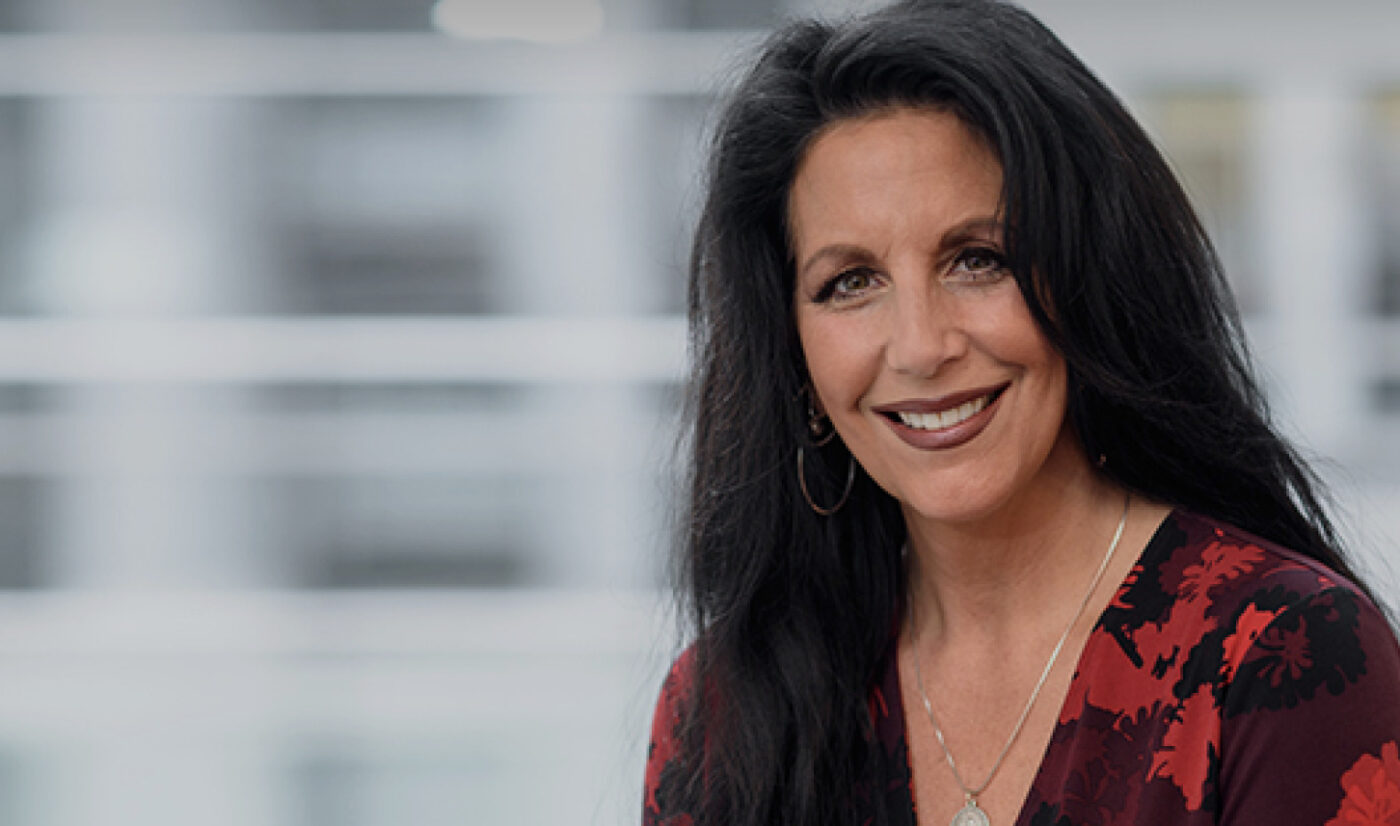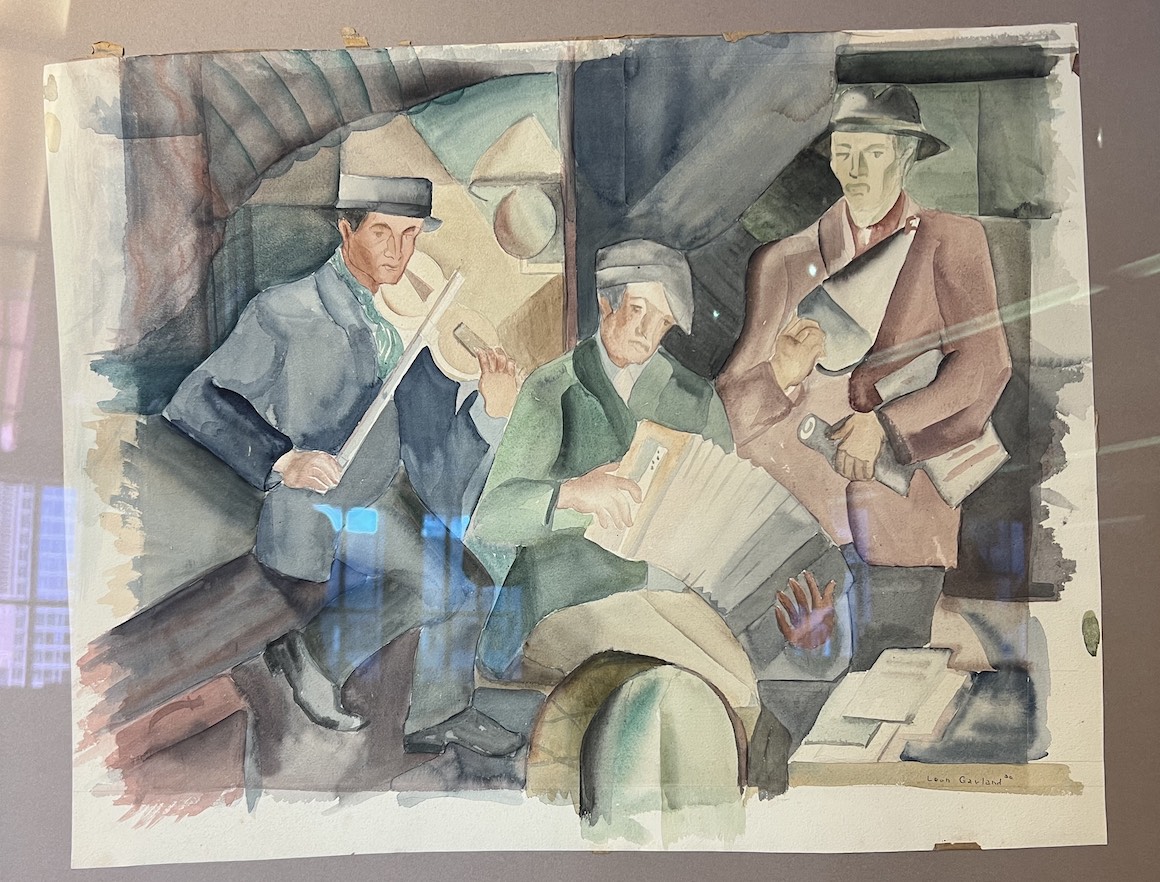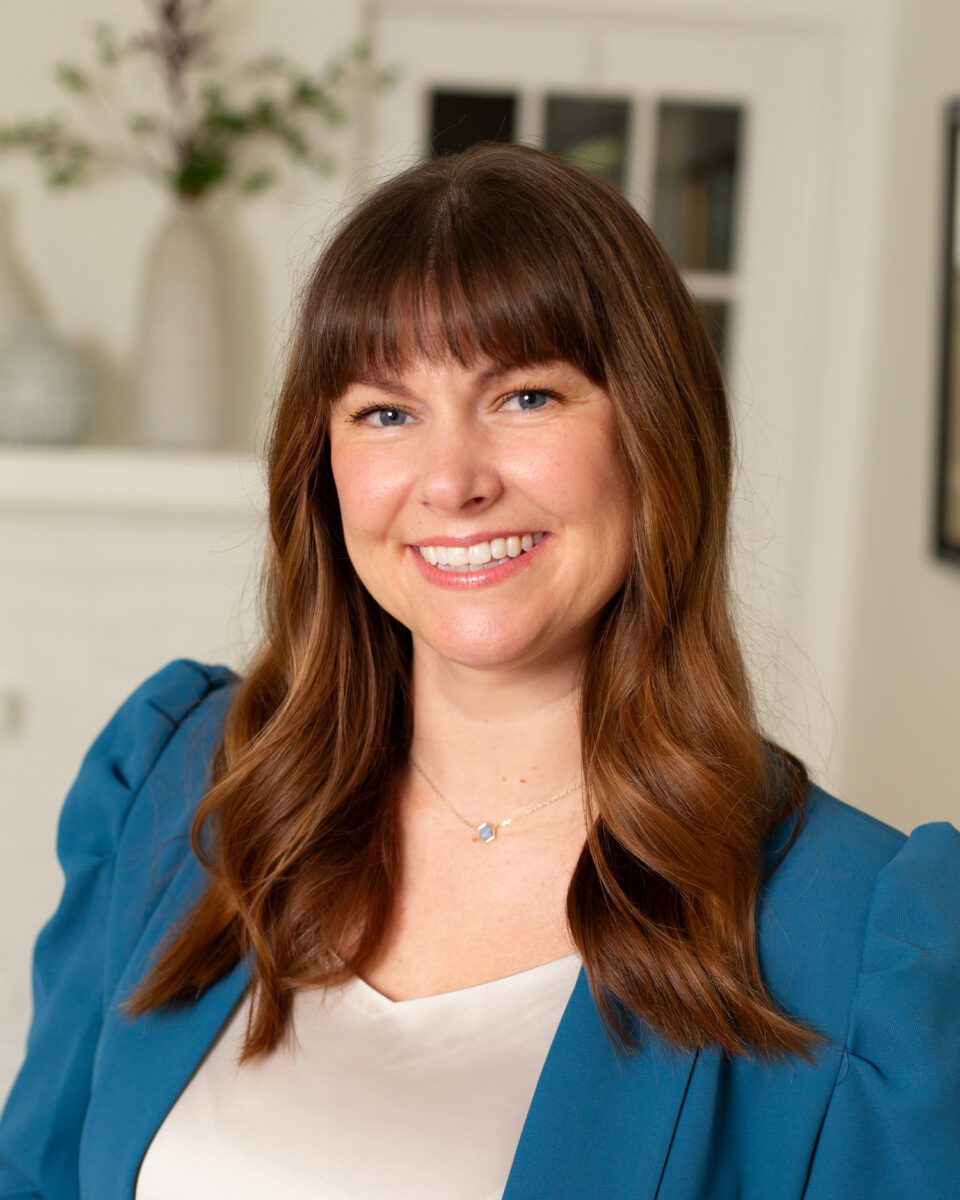
Doctor of Philosophy (Ph.D.) in Art Therapy
Online
The Adler University online Doctorate in Philosophy in Art Therapy is one of the few programs of its kind in the U.S. Designed for experienced clinicians, the program integrates online study, training, mentorship, and research to advance leadership in practice, supervision, and education.
- 60 credits
- 3-year program, full-time study
- No residency
- Part-time opportunities
- Clinical experience
- Licensure preparation
Admission Deadlines
| Term | Priority | Final |
|---|---|---|
| Fall 2026 | 12/1/2025 | 2/15/2026 |
Program overview
Art therapy is increasingly recognized for its impact on mental health, education, and community well-being. Advancing the field requires doctoral-level preparation to expand research, strengthen clinical supervision, and prepare the next generation of leaders. Adler University’s Ph.D. in art therapy responds to this need by preparing scholar-practitioners to advance theory, practice, and systems of care.
Through advanced coursework and a 700-hour doctoral internship, students gain the clinical, supervisory, and scholarly expertise needed to shape the future of the profession.
Why choose the online Ph.D. in art therapy at Adler?
- Fully online format: One of the few doctoral art therapy programs offered entirely online, balancing asynchronous coursework with live sessions for meaningful engagement and flexibility.
- Doctoral internship: Complete a 700-hour internship in schools, health care systems, or community organizations to integrate advanced art therapy practice with systemic impact.
- Residency-free model: Build connections with peers and faculty entirely online, without travel requirements.
- Doctoral dissertation: Contribute original research that advances art therapy theory, practice, and education.
- Mentorship from leaders: Learn in small classes guided by faculty who are active researchers, clinical supervisors, and leaders in the field.
LEARNING online
Designed for working professionals who want advanced training without putting their careers on hold, the program is designed to be completed in three years full-time, with part-time options available.
Courses combine asynchronous learning with live sessions on Mondays and Tuesdays, creating space for meaningful interaction while supporting balance and flexibility.
Students engage directly with faculty mentors and peers through real-time discussions, collaborative projects, and art-based practice, building a vibrant learning community that extends beyond the screen.
PATHWAY TO certification
Graduates of this doctoral program are eligible to apply for these licensures and credentials.
Registered Art Therapist – Provisional (ATR-P)
The credential of Registered Art Therapist (ATR-P) through the Art Therapy Credentials Board (ATCB), may be attained upon completing all necessary post-graduate training.
Registered Art Therapist (ATR)
The credential of Registered Art Therapist (ATR) through the Art Therapy Credentials Board (ATCB), may be attained upon completing all necessary post-graduate training.

The path ahead with an Adler degree
Our doctoral program prepares leaders in the field of art therapy and beyond, for senior-level capacities as innovators, educators, and administrators.
Potential career applications include:
• Consultants
• Private practice
• Hospitals
• Schools
• Agencies
• Administrators and clinical supervisors
• Advancing clinical practice as a practitioner-scholar
• Human-service, healthcare, and community contexts
• Academia as an instructor, faculty member or curriculum developer
• Grant-writing as a community leader or activist
*Data is from the 2024 Occupational Outlook Handbook from the Bureau of Labor Statistics
Admissions requirements
Eligibility
- A master’s degree, by the date of matriculation, in art therapy from an accredited institution and a degree in the field of mental health, such as a master or doctoral degree in counseling, psychology, social work, or couple and family therapy.
- Applicants who did not graduate from Adler University’s Master of Arts in Counseling: Art Therapy program or an equivalent program will be required to complete the equivalency requirements in addition to the doctoral curriculum.
- Proof of registration as an art therapist or 18 hours of studio credit hours.
- A cumulative grade point average (GPA) of 3.0 or higher (on a 4.0 scale) in applicant’s graduate degree program.
Application Requirements
Applicants must submit the following materials for admission consideration:
- Completed application submitted via the online portal.
- Application fee.
- Statement of Intent.
- Official valid transcripts from all undergraduate and graduate schools attended (U.S and Canada).
- Unofficial transcripts may be accepted for any schools in which a degree was not received.
- International transcripts must be evaluated by a transcript evaluation service.
- Two letters of recommendation from individuals who can speak to the applicant’s likelihood of success in a doctoral program.*
Approved applicants will be invited to complete an interview with faculty.
*Applicants who are graduates in good standing from Adler University’s Master of Arts in Counseling: Art Therapy program may have one letter of recommendation and/or interview waived.
Statement of Intent
Applicants are required to provide a statement of intent answering the following questions. They should be 2-3 pages, double-spaced.
- Applicants are required to provide a statement of intent answering the following questions. They should be 2-3 pages, double-spaced.
- Why are you interested in your chosen field and program?
- Why is Adler University’s program a good fit for you?
- Adler University mission is based on social justice. Share your perspective of social justice.
- What are your career goals and interests?
Portfolio
Applicants must present a portfolio of 15 original works, created in at least three different media, demonstrating skill with art materials at the admission interview.
How to apply
- Complete your application in Adler University’s online portal. The application, fee, Statement of Intent, resume/CV, and references’ details are submitted in the portal.
- Official transcripts must be sent directly from each issuing institution or approved service to the Office of Admissions prior to the application deadline. Do not upload official copies to the portal.
Adler University – Office of Admissions
17 N. Dearborn Street
Chicago, IL 60602
Official electronic transcripts should be sent to admissions@adler.edu.
Curriculum | Internships | PRACTICUMS
Successful completion of the 60-credit-hour Doctor of Philosophy in Art Therapy program includes coursework and a training practicum from those listed below.
Completion of the program includes the courses below, along with additional requirements outlined in the Adler University catalog.
CORE COURSES
Professional Orientation I
This course will provide students with an opportunity to meet in a small group with peers and faculty. The professional orientation covers advisement and mentoring around Adler University degree requirements and mission and an orientation to the fields of art, art therapy, clinical supervision, education, advocacy, and art therapy research, informed by Adlerian values and concepts as they relate to the students’ personal and professional growth.
Advanced Philosophy of Art I
In this course, students will learn to think philosophically about human creativity symbol, image, and metaphor and the role of the arts for the advanced practice of art therapy. Historical and western perspectives of arts-relevant philosophies will be examined in relationship to the role of aesthetics in service of alleviating human suffering.
Community Engagement and Socially Responsible Leadership
Integrating the Adlerian foundation of community engagement into current approaches to leadership will help the student gain skills in best practices in art therapy research, education, clinical supervision, program development and social advocacy.
Neurodiversity and Neuroaesthetics
This course will examine individual differences, primarily through the lenses of neuroscience, neuroaesthetics, and evolutionary psychology. The role of art and art-making in enhancing individual strengths will be a primary focus.
Professional Orientation II
This course will continue to provide students with an opportunity to meet in a small group with peers and faculty. The professional orientation covers advisement and mentoring around Adler University degree requirements and mission and an orientation to the fields of art, art therapy, clinical supervision, education, advocacy, and art therapy research, informed by Adlerian values and concepts as they relate to the students’ personal and professional growth.
Advanced Philosophy of Art II
This course provides a continued exploration of art philosophy/aesthetics, focusing on Eastern, interdisciplinary approaches, and contemporary thinking such as eco-aesthetics. Students will gain an understanding of and appreciation for philosophies of art as these philosophies relate to current practices in the field of art therapy, particularly as they influence practices in clinical supervision, education and research.
Qualitative and Emergent Research Methods in Art Therapy
This course will survey major qualitative research methodologies with an emphasis on ethical and socially responsible research practices. The course will include critical reviews of major qualitative methods, such as phenomenology, case studies, ethnographic and heuristic research designs.
Professional Identity and Advanced Ethics
This course focuses on how the Ethical Principles for Art Therapists set forth by the American Art Therapy Association (AATA), the Art Therapy Credentials Board (ATCB), and the Commission on Accreditation of Allied Health Education Programs (CAAHEP) promote and maintain the standards of Art Therapy.
Quantitative Research Methods and Art Therapy
This course focuses on best practices in quantitative research and the application of both descriptive and inferential statistical analysis with a focus on art therapy. The course will include a critical review of current research, including design limitations and recommendations for improvement.
Clinical Supervision and Consultation
This course will give students an opportunity to research models and theories informing consultation and clinical supervision, including art-based supervision, in a variety of settings. A review of all dimensions of supervision will include the supervisory contract, the supervisory relationship and issues related to countertransference, diversity, gender, and power differentials.
Foundations in Thanatology in Art Therapy
This course focuses on the foundational principles, applications and cultural expressions within the field of thanatology. Topics to be examined include personal and societal attitudes towards death, dying, grief, bereavement, and loss as well as different models of grief.
Art Therapy Pedagogy and Art Based Research
This class explores the teaching and learning approaches to cultural and clinical mental health education, application, and practice through the exploration of epistemologies of justified beliefs and the rationale of different knowledge claims as they relate to Intersectionality in regards to race, ethnicity, language, spirituality, religion, values, beliefs, abilities, class, sexuality, gender and marginalized populations.
Applied Statistics in Research and Art Therapy
This course provides an overview of advanced statistical methods and techniques. Upon the completion of the course, students will be able to select and apply appropriate statistical methods to specific research questions.
ELECTIVES
Students select four electives, with approval from their faculty advisor, from a range of options such as:
Special Topics in Art Therapy
The Special Topics course is designed to examine special interests, including current and emerging issues and interdisciplinary topics. Topics will alternate and address the following: Advanced Lifespan Issues; Aging, Military Veterans and Families, Spiritual and Alternative Approaches to Healing, Advanced Adlerian Theory & Integrative Therapy Experientials & Interventions, and Advanced Methods and Theories of Intersectionality & Community Engagement.
Trauma Informed Care
This course provides an advanced examination of conceptualizations and approaches to trauma related to emotional, sexual, physical and political violence and terrorism, emotional abuse and neglect, including forms of system-induced trauma.
Seminar in Human Sexuality
This course examines personal and interpersonal dimensions of the human sexual experience, including sexual issues in the context of oppression, liberation and social justice. Several domains that influence sexuality will be explored, including gender identity, sexual orientation, sexual attitudes and sexual behavior.
Intermodal Application in Art Therapy
This course examines basic principles of expressive arts therapy, education and consultation; in particular the underlying theory that supports the integrated application of the arts in therapy. Course content will focus on what all art forms have in common.
Advanced Adlerian Theory and Integrative Art Therapy Experientials and Interventions
This course covers the theoretical principles of individual psychology and Adlerian theory, including striving for holism, phenomenology, teleology, and social interest. This course addresses the cognitive, affective, and sociocultural dimensions of the individual’s development; the selectivity of perception in the formation of one’s worldview; motivational factors; creativity and the arts; and the indivisibility of the person.
SOCIAL JUSTICE PRACTICUM
Your opportunity to create lasting change on local and global systems, almost from day 1.
The Social Justice Practicum (SJP) at Adler University is a first-year non-clinical, community-based experience that reflects Alfred Adler’s concept of social interest. The practicum places students with mission-driven organizations where they complete a minimum of 200 approved hours across two semesters, typically 8–10 hours per week. Alongside their placements, students participate in required workshops. Each practicum is evaluated through midterm and final supervisor reviews, student self-assessments, and feedback on the site and project, with grades of High Pass, Pass, Remediation, or Fail. The experience culminates in a campus-wide presentation of outcomes, assessed by multiple evaluators, offering students both applied training and the opportunity to contribute to meaningful community change.
FIELD TRAINING + SEMINARS
Doctoral Internship and Seminar I
The Doctoral Internship and Seminar provides students with a field experience designed to apply socially responsible practice within a focus of their choice, to engage in research activities, to enrich their professional portfolios, and to strengthen their career possibilities as researchers, clinical supervisors, and educators.
Doctoral Internship and Seminar II
This is a continuation of the Doctoral Internship and Seminar experience toward the goal of completing the 700 hour requirement. This course focuses on the implementation of the student’s dissertation proposal developed and approved in Dissertation I.
Doctoral Internship and Seminar III
The third term of externship field placement includes delivery of sport and human performance services under the mentorship of a sport psychology consultant who is certified by the Association for Applied Sport Psychology (CMPC). The field experience is paired with a seminar during which students utilize a peer consultation model to develop skills related to sport and health psychology and professional development.
DISSERTATION
Designed to contribute to a student’s knowledge, skills, and values in scholarship and its importance to the practice of clinical art therapy.
Dissertation I
The doctoral dissertation is designed to contribute to a student’s knowledge, skills, and values in scholarship and its importance to the practice of clinical art therapy. The student will engage in in-depth scholarship and research on an important issue in the field of art therapy.
Dissertation II
Students will submit their study for review by Adler University’s Institutional Review Board. Completion of this phase is the goal of Internship I. Once IRB approval has been granted, the student will complete the necessary actions to conduct research and write the document.
Dissertation III
Once students have received IRB approval, they may enroll in the Dissertation III. Completion of the project is the goal, including preparation for oral defense. Students successfully defend their doctoral dissertation before the dissertation committee.

“As an Adler graduate, advocate of the arts in the community, and a witness to urban revitalization through the arts, I value self-expression, self-reflection, critical thinking, and arts advocacy. As a fourth generation Chicagoan, my roots in neighborhood support, social responsibility, unity in diversity, and activism run deep.”
– Jennifer LaCivita, Psy.D.
Program Director

Financing your degree
Use our tuition calculator to help you start to plan your budget. Financial aid from the government, scholarships, or part-time employment can help you more easily afford your degree.
Please make a selection using the filters above.
Art Therapy | Ph.D.
Year
1Credits
35Tuition
$35,035Fees
$3,222Total
$38,257Term
FallCredits
12Tuition
$12,012Fees
$1,074Total
$13,086Term
SpringCredits
12Tuition
$12,012Fees
$1,074Total
$13,086Term
SummerCredits
11Tuition
$11,011Fees
$1,074Total
$12,085Art Therapy | Ph.D.
Year
1Credits
35Tuition
$35,035Fees
$7,428Total
$42,463Term
FallCredits
12Tuition
$12,012Fees
$2,476Total
$14,488Term
SpringCredits
12Tuition
$12,012Fees
$2,476Total
$14,488Term
SummerCredits
11Tuition
$11,011Fees
$2,476Total
$13,487Art Therapy | Ph.D.
Year
2Credits
18Tuition
$18,018Fees
$3,222Total
$21,240Term
FallCredits
9Tuition
$9,009Fees
$1,074Total
$10,083Term
SpringCredits
7Tuition
$7,007Fees
$1,074Total
$8,081Term
SummerCredits
2Tuition
$2,002Fees
$1,074Total
$3,076Art Therapy | Ph.D.
Year
2Credits
18Tuition
$18,018Fees
$7,428Total
$25,446Term
FallCredits
9Tuition
$9,009Fees
$2,476Total
$11,485Term
SpringCredits
7Tuition
$7,007Fees
$2,476Total
$9,483Term
SummerCredits
2Tuition
$2,002Fees
$2,476Total
$4,478Art Therapy | Ph.D.
Year
3Credits
9Tuition
$9,009Fees
$3,222Total
$12,231Term
FallCredits
3Tuition
$3,003Fees
$1,074Total
$4,077Term
SpringCredits
3Tuition
$3,003Fees
$1,074Total
$4,077Term
SummerCredits
3Tuition
$3,003Fees
$1,074Total
$4,077Art Therapy | Ph.D.
Year
3Credits
9Tuition
$9,009Fees
$7,428Total
$16,437Term
FallCredits
3Tuition
$3,003Fees
$2,476Total
$5,479Term
SpringCredits
3Tuition
$3,003Fees
$2,476Total
$5,479Term
SummerCredits
3Tuition
$3,003Fees
$2,476Total
$5,479Clinical Mental Health Counseling | M.A.
Year
1Credits
18Tuition
$29,106Fees
$1,806Total
$30,912Term
FallCredits
6Tuition
$9,702Fees
$602Total
$10,304Term
SpringCredits
6Tuition
$9,702Fees
$602Total
$10,304Term
SummerCredits
6Tuition
$9,702Fees
$602Total
$10,304Clinical Mental Health Counseling | M.A.
Year
1Credits
18Tuition
$29,106Fees
$6,012Total
$35,118Term
FallCredits
6Tuition
$9,702Fees
$2,004Total
$11,706Term
SpringCredits
6Tuition
$9,702Fees
$2,004Total
$11,706Term
SummerCredits
6Tuition
$9,702Fees
$2,004Total
$11,706Clinical Mental Health Counseling | M.A.
Year
2Credits
20Tuition
$32,340Fees
$1,806Total
$34,146Term
FallCredits
7Tuition
$11,319Fees
$602Total
$11,921Term
SpringCredits
7Tuition
$11,319Fees
$602Total
$11,921Term
SummerCredits
6Tuition
$9,702Fees
$602Total
$10,304Clinical Mental Health Counseling | M.A.
Year
2Credits
20Tuition
$32,340Fees
$6,012Total
$38,352Term
FallCredits
7Tuition
$11,319Fees
$2,004Total
$13,323Term
SpringCredits
7Tuition
$11,319Fees
$2,004Total
$13,323Term
SummerCredits
6Tuition
$9,702Fees
$2,004Total
$11,706Clinical Mental Health Counseling | M.A.
Year
3Credits
18Tuition
$29,106Fees
$1,806Total
$30,912Term
FallCredits
6Tuition
$9,702Fees
$602Total
$10,304Term
SpringCredits
6Tuition
$9,702Fees
$602Total
$10,304Term
SummerCredits
6Tuition
$9,702Fees
$602Total
$10,304Clinical Mental Health Counseling | M.A.
Year
3Credits
18Tuition
$29,106Fees
$6,012Total
$35,118Term
FallCredits
6Tuition
$9,702Fees
$2,004Total
$11,706Term
SpringCredits
6Tuition
$9,702Fees
$2,004Total
$11,706Term
SummerCredits
6Tuition
$9,702Fees
$2,004Total
$11,706Clinical Mental Health Counseling | M.A.
Year
4Credits
6Tuition
$9,702Fees
$1,806Total
$11,508Term
FallCredits
2Tuition
$3,234Fees
$602Total
$3,836Term
SpringCredits
2Tuition
$3,234Fees
$602Total
$3,836Term
SummerCredits
2Tuition
$3,234Fees
$602Total
$3,836Clinical Mental Health Counseling | M.A.
Year
4Credits
6Tuition
$9,702Fees
$6,012Total
$15,714Term
FallCredits
2Tuition
$3,234Fees
$2,004Total
$5,238Term
SpringCredits
2Tuition
$3,234Fees
$2,004Total
$5,238Term
SummerCredits
2Tuition
$3,234Fees
$2,004Total
$5,238Clinical Psychology | Psy.D.
Year
1Credits
36Tuition
$67,644Fees
$2,400Total
$70,044Term
FallCredits
13Tuition
$24,427Fees
$800Total
$25,227Term
SpringCredits
12Tuition
$22,548Fees
$800Total
$23,348Term
SummerCredits
11Tuition
$20,669Fees
$800Total
$21,469Clinical Psychology | Psy.D.
Year
1Credits
36Tuition
$67,644Fees
$6,606Total
$74,250Term
FallCredits
13Tuition
$24,427Fees
$2,202Total
$26,629Term
SpringCredits
12Tuition
$22,548Fees
$2,202Total
$24,750Term
SummerCredits
11Tuition
$20,669Fees
$2,202Total
$22,871Clinical Psychology | Psy.D.
Year
2Credits
36Tuition
$67,644Fees
$2,400Total
$70,044Term
FallCredits
13Tuition
$24,427Fees
$800Total
$25,227Term
SpringCredits
13Tuition
$24,427Fees
$800Total
$25,227Term
SummerCredits
10Tuition
$18,790Fees
$800Total
$19,590Clinical Psychology | Psy.D.
Year
2Credits
36Tuition
$67,644Fees
$6,606Total
$74,250Term
FallCredits
13Tuition
$24,427Fees
$2,202Total
$26,629Term
SpringCredits
13Tuition
$24,427Fees
$2,202Total
$26,629Term
SummerCredits
10Tuition
$18,790Fees
$2,202Total
$20,992Clinical Psychology | Psy.D.
Year
3Credits
25.5Tuition
$47,915Fees
$2,400Total
$50,315Term
FallCredits
10.5Tuition
$19,730Fees
$800Total
$20,530Term
SpringCredits
7.5Tuition
$14,093Fees
$800Total
$14,893Term
SummerCredits
7.5Tuition
$14,093Fees
$800Total
$14,893Clinical Psychology | Psy.D.
Year
3Credits
25.5Tuition
$47,915Fees
$6,606Total
$54,521Term
FallCredits
10.5Tuition
$19,730Fees
$2,202Total
$21,932Term
SpringCredits
7.5Tuition
$14,093Fees
$2,202Total
$16,295Term
SummerCredits
7.5Tuition
$14,093Fees
$2,202Total
$16,295Clinical Psychology | Psy.D.
Year
4Credits
16.5Tuition
$31,004Fees
$2,400Total
$33,404Term
FallCredits
8.5Tuition
$15,972Fees
$800Total
$16,772Term
SpringCredits
4.5Tuition
$8,456Fees
$800Total
$9,256Term
SummerCredits
3.5Tuition
$6,577Fees
$800Total
$7,377Clinical Psychology | Psy.D.
Year
4Credits
16.5Tuition
$31,004Fees
$6,606Total
$37,610Term
FallCredits
8.5Tuition
$15,972Fees
$2,202Total
$18,174Term
SpringCredits
4.5Tuition
$8,456Fees
$2,202Total
$10,658Term
SummerCredits
3.5Tuition
$6,577Fees
$2,202Total
$8,779Clinical Psychology | Psy.D.
Year
5Credits
0Tuition
$0Fees
$2,400Total
$2,400Term
FallCredits
0Tuition
$0Fees
$800Total
$800Term
SpringCredits
0Tuition
$0Fees
$800Total
$800Term
SummerCredits
0Tuition
$0Fees
$800Total
$800Clinical Psychology | Psy.D.
Year
5Credits
0Tuition
$0Fees
$6,606Total
$6,606Term
FallCredits
0Tuition
$0Fees
$2,202Total
$2,202Term
SpringCredits
0Tuition
$0Fees
$2,202Total
$2,202Term
SummerCredits
0Tuition
$0Fees
$2,202Total
$2,202Clinical Psychology | Psy.D.
Year
1Credits
42Tuition
$56,574Fees
$2,140Total
$58,714Term
FallCredits
15Tuition
$20,205Fees
$1,060Total
$21,265Term
SpringCredits
14Tuition
$18,858Fees
$540Total
$19,398Term
SummerCredits
13Tuition
$17,511Fees
$540Total
$18,051**Student Care is a student led health care plan and rates are likely to change each year; opt out with proof of other insurance is available
Clinical Psychology | Psy.D.
Year
1Credits
42Tuition
$56,574Fees
$6,340Total
$62,914Term
FallCredits
15Tuition
$20,205Fees
$2,460Total
$22,665Term
SpringCredits
14Tuition
$18,858Fees
$1,940Total
$20,798Term
SummerCredits
13Tuition
$17,511Fees
$1,940Total
$19,451**Student Care is a student led health care plan and rates are likely to change each year; opt out with proof of other insurance is available
Clinical Psychology | Psy.D.
Year
2Credits
24Tuition
$32,328Fees
$2,140Total
$34,468Term
FallCredits
8Tuition
$10,776Fees
$1,060Total
$11,836Term
SpringCredits
8Tuition
$10,776Fees
$540Total
$11,316Term
SummerCredits
8Tuition
$10,776Fees
$540Total
$11,316**Student Care is a student led health care plan and rates are likely to change each year; opt out with proof of other insurance is available
Clinical Psychology | Psy.D.
Year
2Credits
24Tuition
$32,328Fees
$6,340Total
$38,668Term
FallCredits
8Tuition
$10,776Fees
$2,460Total
$13,236Term
SpringCredits
8Tuition
$10,776Fees
$1,940Total
$12,716Term
SummerCredits
8Tuition
$10,776Fees
$1,940Total
$12,716**Student Care is a student led health care plan and rates are likely to change each year; opt out with proof of other insurance is available
Clinical Psychology | Psy.D.
Year
3Credits
20Tuition
$26,940Fees
$4,834Total
$31,774Term
FallCredits
8Tuition
$10,776Fees
$1,060Total
$11,836Term
SpringCredits
9Tuition
$12,123Fees
$540Total
$12,663Term
SummerCredits
3Tuition
$4,041Fees
$3,234Total
$7,275**Student Care is a student led health care plan and rates are likely to change each year; opt out with proof of other insurance is available
Clinical Psychology | Psy.D.
Year
3Credits
20Tuition
$26,940Fees
$9,034Total
$35,974Term
FallCredits
8Tuition
$10,776Fees
$2,460Total
$13,236Term
SpringCredits
9Tuition
$12,123Fees
$1,940Total
$14,063Term
SummerCredits
3Tuition
$4,041Fees
$4,634Total
$8,675**Student Care is a student led health care plan and rates are likely to change each year; opt out with proof of other insurance is available
Clinical Psychology | Psy.D.
Year
4Credits
18Tuition
$24,246Fees
$2,140Total
$26,386Term
FallCredits
7Tuition
$9,429Fees
$1,060Total
$10,489Term
SpringCredits
4Tuition
$5,388Fees
$540Total
$5,928Term
SummerCredits
7Tuition
$9,429Fees
$540Total
$9,969**Student Care is a student led health care plan and rates are likely to change each year; opt out with proof of other insurance is available
Clinical Psychology | Psy.D.
Year
4Credits
18Tuition
$24,246Fees
$6,340Total
$30,586Term
FallCredits
7Tuition
$9,429Fees
$2,460Total
$11,889Term
SpringCredits
4Tuition
$5,388Fees
$1,940Total
$7,328Term
SummerCredits
7Tuition
$9,429Fees
$1,940Total
$11,369**Student Care is a student led health care plan and rates are likely to change each year; opt out with proof of other insurance is available
Clinical Psychology | Psy.D.
Year
5Credits
3Tuition
$4,041Fees
$2,140Total
$6,181Term
FallCredits
1Tuition
$1,347Fees
$1,060Total
$2,407Term
SpringCredits
1Tuition
$1,347Fees
$540Total
$1,887Term
SummerCredits
1Tuition
$1,347Fees
$540Total
$1,887**Student Care is a student led health care plan and rates are likely to change each year; opt out with proof of other insurance is available
Clinical Psychology | Psy.D.
Year
5Credits
3Tuition
$4,041Fees
$6,340Total
$10,381Term
FallCredits
1Tuition
$1,347Fees
$2,460Total
$3,807Term
SpringCredits
1Tuition
$1,347Fees
$1,940Total
$3,287Term
SummerCredits
1Tuition
$1,347Fees
$1,940Total
$3,287**Student Care is a student led health care plan and rates are likely to change each year; opt out with proof of other insurance is available
Counseling: Art Therapy | M.A.
Year
1Credits
38Tuition
$61,446Fees
$1,434Total
$62,880Term
FallCredits
14Tuition
$22,638Fees
$478Total
$23,116Term
SpringCredits
12Tuition
$19,404Fees
$478Total
$19,882Term
SummerCredits
12Tuition
$19,404Fees
$478Total
$19,882Counseling: Art Therapy | M.A.
Year
1Credits
38Tuition
$61,446Fees
$5,640Total
$67,086Term
FallCredits
14Tuition
$22,638Fees
$1,880Total
$24,518Term
SpringCredits
12Tuition
$19,404Fees
$1,880Total
$21,284Term
SummerCredits
12Tuition
$19,404Fees
$1,880Total
$21,284Counseling: Art Therapy | M.A.
Year
2Credits
28Tuition
$45,276Fees
$1,434Total
$46,710Term
FallCredits
12Tuition
$19,404Fees
$478Total
$19,882Term
SpringCredits
9Tuition
$14,553Fees
$478Total
$15,031Term
SummerCredits
7Tuition
$11,319Fees
$478Total
$11,797Counseling: Art Therapy | M.A.
Year
2Credits
28Tuition
$45,276Fees
$5,640Total
$50,916Term
FallCredits
12Tuition
$19,404Fees
$1,880Total
$21,284Term
SpringCredits
9Tuition
$14,553Fees
$1,880Total
$16,433Term
SummerCredits
7Tuition
$11,319Fees
$1,880Total
$13,199Counselling Psychology | M.A
Year
1Credits
35Tuition
$42,385Fees
$3,585Total
$45,970Term
FallCredits
14Tuition
$16,954Fees
$1,175Total
$18,129Term
SpringCredits
11Tuition
$13,321Fees
$655Total
$13,976Term
SummerCredits
10Tuition
$12,110Fees
$1,755Total
$13,865**Student Care is a student led health care plan and rates are likely to change each year; opt out with proof of other insurance is available
Counselling Psychology | M.A
Year
1Credits
35Tuition
$42,385Fees
$7,785Total
$50,170Term
FallCredits
14Tuition
$16,954Fees
$2,575Total
$19,529Term
SpringCredits
11Tuition
$13,321Fees
$2,055Total
$15,376Term
SummerCredits
10Tuition
$12,110Fees
$3,155Total
$15,265**Student Care is a student led health care plan and rates are likely to change each year; opt out with proof of other insurance is available
Counselling Psychology | M.A
Year
2Credits
24Tuition
$29,064Fees
$3,696Total
$32,760Term
FallCredits
10Tuition
$12,110Fees
$1,175Total
$13,285Term
SpringCredits
7Tuition
$8,477Fees
$655Total
$9,132Term
SummerCredits
7Tuition
$8,477Fees
$1,866Total
$10,343**Student Care is a student led health care plan and rates are likely to change each year; opt out with proof of other insurance is available
Counselling Psychology | M.A
Year
2Credits
24Tuition
$29,064Fees
$7,896Total
$36,960Term
FallCredits
10Tuition
$12,110Fees
$2,575Total
$14,685Term
SpringCredits
7Tuition
$8,477Fees
$2,055Total
$10,532Term
SummerCredits
7Tuition
$8,477Fees
$3,266Total
$11,743**Student Care is a student led health care plan and rates are likely to change each year; opt out with proof of other insurance is available
Counselling Psychology | MCP
Year
1Credits
34Tuition
$41,174Fees
$2,633Total
$43,807Term
FallCredits
14Tuition
$16,954Fees
$511Total
$17,465Term
SpringCredits
11Tuition
$13,321Fees
$511Total
$13,832Term
SummerCredits
9Tuition
$10,899Fees
$1,611Total
$12,510Counselling Psychology | MCP
Year
1Credits
34Tuition
$41,174Fees
$2,633Total
$43,807Term
FallCredits
14Tuition
$16,954Fees
$511Total
$17,465Term
SpringCredits
11Tuition
$13,321Fees
$511Total
$13,832Term
SummerCredits
9Tuition
$10,899Fees
$1,611Total
$12,510Counselling Psychology | MCP
Year
2Credits
21Tuition
$25,431Fees
$2,744Total
$28,175Term
FallCredits
9Tuition
$10,899Fees
$511Total
$11,410Term
SpringCredits
6Tuition
$7,266Fees
$511Total
$7,777Term
SummerCredits
6Tuition
$7,266Fees
$1,722Total
$8,988Counselling Psychology | MCP
Year
2Credits
21Tuition
$25,431Fees
$2,744Total
$28,175Term
FallCredits
9Tuition
$10,899Fees
$511Total
$11,410Term
SpringCredits
6Tuition
$7,266Fees
$511Total
$7,777Term
SummerCredits
6Tuition
$7,266Fees
$1,722Total
$8,988Counselling Psychology: Art Therapy | MCP:AT
Year
1Credits
34Tuition
$41,174Fees
$3,516Total
$44,690Term
FallCredits
11Tuition
$13,321Fees
$1,152Total
$14,473Term
SpringCredits
14Tuition
$16,954Fees
$632Total
$17,586Term
SummerCredits
9Tuition
$10,899Fees
$1,732Total
$12,631**Student Care is a student led health care plan and rates are likely to change each year; opt out with proof of other insurance is available
Counselling Psychology: Art Therapy | MCP:AT
Year
1Credits
34Tuition
$41,174Fees
$7,716Total
$48,890Term
FallCredits
11Tuition
$13,321Fees
$2,552Total
$15,873Term
SpringCredits
14Tuition
$16,954Fees
$2,032Total
$18,986Term
SummerCredits
9Tuition
$10,899Fees
$3,132Total
$14,031**Student Care is a student led health care plan and rates are likely to change each year; opt out with proof of other insurance is available
Counselling Psychology: Art Therapy | MCP:AT
Year
2Credits
26Tuition
$31,486Fees
$3,627Total
$35,113Term
FallCredits
12Tuition
$14,532Fees
$1,152Total
$15,684Term
SpringCredits
12Tuition
$14,532Fees
$632Total
$15,164Term
SummerCredits
2Tuition
$2,422Fees
$1,843Total
$4,265**Student Care is a student led health care plan and rates are likely to change each year; opt out with proof of other insurance is available
Counselling Psychology: Art Therapy | MCP:AT
Year
2Credits
26Tuition
$31,486Fees
$7,827Total
$39,313Term
FallCredits
12Tuition
$14,532Fees
$2,552Total
$17,084Term
SpringCredits
12Tuition
$14,532Fees
$2,032Total
$16,564Term
SummerCredits
2Tuition
$2,422Fees
$3,243Total
$5,665**Student Care is a student led health care plan and rates are likely to change each year; opt out with proof of other insurance is available
Counselling Psychology: School and Youth | M.A.
Year
1Credits
41Tuition
$49,651Fees
$3,585Total
$53,236Term
FallCredits
14Tuition
$16,954Fees
$1,175Total
$18,129Term
SpringCredits
14Tuition
$16,954Fees
$655Total
$17,609Term
SummerCredits
13Tuition
$15,743Fees
$1,755Total
$17,498**Student Care is a student led health care plan and rates are likely to change each year; opt out with proof of other insurance is available
Counselling Psychology: School and Youth | M.A.
Year
1Credits
41Tuition
$49,651Fees
$7,785Total
$57,436Term
FallCredits
14Tuition
$16,954Fees
$2,575Total
$19,529Term
SpringCredits
14Tuition
$16,954Fees
$2,055Total
$19,009Term
SummerCredits
13Tuition
$15,743Fees
$3,155Total
$18,898**Student Care is a student led health care plan and rates are likely to change each year; opt out with proof of other insurance is available
Counselling Psychology: School and Youth | M.A.
Year
2Credits
18Tuition
$21,798Fees
$3,696Total
$25,494Term
FallCredits
4Tuition
$4,844Fees
$1,175Total
$6,019Term
SpringCredits
4Tuition
$4,844Fees
$655Total
$5,499Term
SummerCredits
10Tuition
$12,110Fees
$1,866Total
$13,976**Student Care is a student led health care plan and rates are likely to change each year; opt out with proof of other insurance is available
Counselling Psychology: School and Youth | M.A.
Year
2Credits
18Tuition
$21,798Fees
$7,896Total
$29,694Term
FallCredits
4Tuition
$4,844Fees
$2,575Total
$7,419Term
SpringCredits
4Tuition
$4,844Fees
$2,055Total
$6,899Term
SummerCredits
10Tuition
$12,110Fees
$3,266Total
$15,376**Student Care is a student led health care plan and rates are likely to change each year; opt out with proof of other insurance is available
Counselling Psychology: School and Youth | MCP:SY
Year
1Credits
41Tuition
$49,651Fees
$3,585Total
$53,236Term
FallCredits
14Tuition
$16,954Fees
$1,175Total
$18,129Term
SpringCredits
14Tuition
$16,954Fees
$655Total
$17,609Term
SummerCredits
13Tuition
$15,743Fees
$1,755Total
$17,498**Student Care is a student led health care plan and rates are likely to change each year; opt out with proof of other insurance is available
Counselling Psychology: School and Youth | MCP:SY
Year
1Credits
41Tuition
$49,651Fees
$7,785Total
$57,436Term
FallCredits
14Tuition
$16,954Fees
$2,575Total
$19,529Term
SpringCredits
14Tuition
$16,954Fees
$2,055Total
$19,009Term
SummerCredits
13Tuition
$15,743Fees
$3,155Total
$18,898**Student Care is a student led health care plan and rates are likely to change each year; opt out with proof of other insurance is available
Counselling Psychology: School and Youth | MCP:SY
Year
2Credits
18Tuition
$21,798Fees
$3,696Total
$25,494Term
FallCredits
4Tuition
$4,844Fees
$1,175Total
$6,019Term
SpringCredits
4Tuition
$4,844Fees
$655Total
$5,499Term
SummerCredits
10Tuition
$12,110Fees
$1,866Total
$13,976**Student Care is a student led health care plan and rates are likely to change each year; opt out with proof of other insurance is available
Counselling Psychology: School and Youth | MCP:SY
Year
2Credits
18Tuition
$21,798Fees
$7,896Total
$29,694Term
FallCredits
4Tuition
$4,844Fees
$2,575Total
$7,419Term
SpringCredits
4Tuition
$4,844Fees
$2,055Total
$6,899Term
SummerCredits
10Tuition
$12,110Fees
$3,266Total
$15,376**Student Care is a student led health care plan and rates are likely to change each year; opt out with proof of other insurance is available
Counselor Education + Supervision | Ph.D.
Year
1Credits
27Tuition
$49,005Fees
$1,686Total
$50,691Term
FallCredits
10Tuition
$18,150Fees
$562Total
$18,712Term
SpringCredits
9Tuition
$16,335Fees
$562Total
$16,897Term
SummerCredits
8Tuition
$14,520Fees
$562Total
$15,082Counselor Education + Supervision | Ph.D.
Year
1Credits
27Tuition
$49,005Fees
$5,892Total
$54,897Term
FallCredits
10Tuition
$18,150Fees
$1,964Total
$20,114Term
SpringCredits
9Tuition
$16,335Fees
$1,964Total
$18,299Term
SummerCredits
8Tuition
$14,520Fees
$1,964Total
$16,484Counselor Education + Supervision | Ph.D.
Year
2Credits
19Tuition
$34,485Fees
$1,686Total
$36,171Term
FallCredits
10Tuition
$18,150Fees
$562Total
$18,712Term
SpringCredits
7Tuition
$12,705Fees
$562Total
$13,267Term
SummerCredits
2Tuition
$3,630Fees
$562Total
$4,192Counselor Education + Supervision | Ph.D.
Year
2Credits
19Tuition
$34,485Fees
$5,892Total
$40,377Term
FallCredits
10Tuition
$18,150Fees
$1,964Total
$20,114Term
SpringCredits
7Tuition
$12,705Fees
$1,964Total
$14,669Term
SummerCredits
2Tuition
$3,630Fees
$1,964Total
$5,594Counselor Education + Supervision | Ph.D.
Year
3Credits
14Tuition
$25,410Fees
$1,686Total
$27,096Term
FallCredits
6Tuition
$10,890Fees
$562Total
$11,452Term
SpringCredits
6Tuition
$10,890Fees
$562Total
$11,452Term
SummerCredits
2Tuition
$3,630Fees
$562Total
$4,192Counselor Education + Supervision | Ph.D.
Year
3Credits
14Tuition
$25,410Fees
$5,892Total
$31,302Term
FallCredits
6Tuition
$10,890Fees
$1,964Total
$12,854Term
SpringCredits
6Tuition
$10,890Fees
$1,964Total
$12,854Term
SummerCredits
2Tuition
$3,630Fees
$1,964Total
$5,594Couple + Family Therapy | M.A.
Year
1Credits
30Tuition
$48,510Fees
$1,536Total
$50,046Term
FallCredits
11Tuition
$17,787Fees
$512Total
$18,299Term
SpringCredits
12Tuition
$19,404Fees
$512Total
$19,916Term
SummerCredits
7Tuition
$11,319Fees
$512Total
$11,831Couple + Family Therapy | M.A.
Year
1Credits
30Tuition
$48,510Fees
$5,742Total
$54,252Term
FallCredits
11Tuition
$17,787Fees
$1,914Total
$19,701Term
SpringCredits
12Tuition
$19,404Fees
$1,914Total
$21,318Term
SummerCredits
7Tuition
$11,319Fees
$1,914Total
$13,233Couple + Family Therapy | M.A.
Year
2Credits
27Tuition
$43,659Fees
$1,536Total
$45,195Term
FallCredits
12Tuition
$19,404Fees
$512Total
$19,916Term
SpringCredits
11Tuition
$17,787Fees
$512Total
$18,299Term
SummerCredits
4Tuition
$6,468Fees
$512Total
$6,980Couple + Family Therapy | M.A.
Year
2Credits
27Tuition
$43,659Fees
$5,742Total
$49,401Term
FallCredits
12Tuition
$19,404Fees
$1,914Total
$21,318Term
SpringCredits
11Tuition
$17,787Fees
$1,914Total
$19,701Term
SummerCredits
4Tuition
$6,468Fees
$1,914Total
$8,382Couple + Family Therapy | Ph.D.
Year
1Credits
21Tuition
$38,115Fees
$1,686Total
$39,801Term
FallCredits
7Tuition
$12,705Fees
$562Total
$13,267Term
SpringCredits
10Tuition
$18,150Fees
$562Total
$18,712Term
SummerCredits
4Tuition
$7,260Fees
$562Total
$7,822Couple + Family Therapy | Ph.D.
Year
1Credits
21Tuition
$38,115Fees
$5,892Total
$44,007Term
FallCredits
7Tuition
$12,705Fees
$1,964Total
$14,669Term
SpringCredits
10Tuition
$18,150Fees
$1,964Total
$20,114Term
SummerCredits
4Tuition
$7,260Fees
$1,964Total
$9,224Couple + Family Therapy | Ph.D.
Year
2Credits
27Tuition
$49,005Fees
$1,686Total
$50,691Term
FallCredits
9Tuition
$16,335Fees
$562Total
$16,897Term
SpringCredits
12Tuition
$21,780Fees
$562Total
$22,342Term
SummerCredits
6Tuition
$10,890Fees
$562Total
$11,452Couple + Family Therapy | Ph.D.
Year
2Credits
27Tuition
$49,005Fees
$5,892Total
$54,897Term
FallCredits
9Tuition
$16,335Fees
$1,964Total
$18,299Term
SpringCredits
12Tuition
$21,780Fees
$1,964Total
$23,744Term
SummerCredits
6Tuition
$10,890Fees
$1,964Total
$12,854Couple + Family Therapy | Ph.D.
Year
3Credits
3Tuition
$5,445Fees
$1,686Total
$7,131Term
FallCredits
1Tuition
$1,815Fees
$562Total
$2,377Term
SpringCredits
1Tuition
$1,815Fees
$562Total
$2,377Term
SummerCredits
1Tuition
$1,815Fees
$562Total
$2,377Couple + Family Therapy | Ph.D.
Year
3Credits
3Tuition
$5,445Fees
$5,892Total
$11,337Term
FallCredits
1Tuition
$1,815Fees
$1,964Total
$3,779Term
SpringCredits
1Tuition
$1,815Fees
$1,964Total
$3,779Term
SummerCredits
1Tuition
$1,815Fees
$1,964Total
$3,779Couple + Family Therapy | Ph.D.
Year
4Credits
3Tuition
$5,445Fees
$1,686Total
$7,131Term
FallCredits
1Tuition
$1,815Fees
$562Total
$2,377Term
SpringCredits
1Tuition
$1,815Fees
$562Total
$2,377Term
SummerCredits
1Tuition
$1,815Fees
$562Total
$2,377Couple + Family Therapy | Ph.D.
Year
4Credits
3Tuition
$5,445Fees
$5,892Total
$11,337Term
FallCredits
1Tuition
$1,815Fees
$1,964Total
$3,779Term
SpringCredits
1Tuition
$1,815Fees
$1,964Total
$3,779Term
SummerCredits
1Tuition
$1,815Fees
$1,964Total
$3,779Forensic Mental Health Leadership | M.A.
Year
1Credits
36Tuition
$58,212Fees
$1,536Total
$59,748Term
FallCredits
13Tuition
$21,021Fees
$512Total
$21,533Term
SpringCredits
13Tuition
$21,021Fees
$512Total
$21,533Term
SummerCredits
10Tuition
$16,170Fees
$512Total
$16,682Forensic Mental Health Leadership | M.A.
Year
1Credits
36Tuition
$58,212Fees
$5,742Total
$63,954Term
FallCredits
13Tuition
$21,021Fees
$1,914Total
$22,935Term
SpringCredits
13Tuition
$21,021Fees
$1,914Total
$22,935Term
SummerCredits
10Tuition
$16,170Fees
$1,914Total
$18,084Forensic Mental Health Leadership | M.A.
Year
2Credits
4.5Tuition
$7,277Fees
$512Total
$7,789Term
FallCredits
4.5Tuition
$7,277Fees
$512Total
$7,789Forensic Mental Health Leadership | M.A.
Year
2Credits
4.5Tuition
$7,277Fees
$1,914Total
$9,191Term
FallCredits
4.5Tuition
$7,277Fees
$1,914Total
$9,191Industrial + Organizational Psychology | M.A.
Year
1Credits
21Tuition
$21,021Fees
$3,222Total
$24,243Term
FallCredits
7Tuition
$7,007Fees
$1,074Total
$8,081Term
SpringCredits
7Tuition
$7,007Fees
$1,074Total
$8,081Term
SummerCredits
7Tuition
$7,007Fees
$1,074Total
$8,081Industrial + Organizational Psychology | M.A.
Year
1Credits
21Tuition
$21,021Fees
$7,428Total
$28,449Term
FallCredits
7Tuition
$7,007Fees
$2,476Total
$9,483Term
SpringCredits
7Tuition
$7,007Fees
$2,476Total
$9,483Term
SummerCredits
7Tuition
$7,007Fees
$2,476Total
$9,483Industrial + Organizational Psychology | M.A.
Year
2Credits
15Tuition
$15,015Fees
$3,222Total
$18,237Term
FallCredits
6Tuition
$6,006Fees
$1,074Total
$7,080Term
SpringCredits
6Tuition
$6,006Fees
$1,074Total
$7,080Term
SummerCredits
3Tuition
$3,003Fees
$1,074Total
$4,077Industrial + Organizational Psychology | M.A.
Year
2Credits
15Tuition
$15,015Fees
$7,428Total
$22,443Term
FallCredits
6Tuition
$6,006Fees
$2,476Total
$8,482Term
SpringCredits
6Tuition
$6,006Fees
$2,476Total
$8,482Term
SummerCredits
3Tuition
$3,003Fees
$2,476Total
$5,479Industrial + Organizational Psychology | M.A.
Year
1Credits
27Tuition
$32,697Fees
$1,890Total
$34,587Term
FallCredits
10Tuition
$12,110Fees
$630Total
$12,740Term
SpringCredits
10Tuition
$12,110Fees
$630Total
$12,740Term
SummerCredits
7Tuition
$8,477Fees
$630Total
$9,107Industrial + Organizational Psychology | M.A.
Year
1Credits
27Tuition
$32,697Fees
$6,090Total
$38,787Term
FallCredits
10Tuition
$12,110Fees
$2,030Total
$14,140Term
SpringCredits
10Tuition
$12,110Fees
$2,030Total
$14,140Term
SummerCredits
7Tuition
$8,477Fees
$2,030Total
$10,507Industrial + Organizational Psychology | M.A.
Year
2Credits
11Tuition
$13,321Fees
$1,890Total
$15,211Term
FallCredits
5Tuition
$6,055Fees
$630Total
$6,685Term
SpringCredits
5Tuition
$6,055Fees
$630Total
$6,685Term
SummerCredits
1Tuition
$1,211Fees
$630Total
$1,841Industrial + Organizational Psychology | M.A.
Year
2Credits
11Tuition
$13,321Fees
$6,090Total
$19,411Term
FallCredits
5Tuition
$6,055Fees
$2,030Total
$8,085Term
SpringCredits
5Tuition
$6,055Fees
$2,030Total
$8,085Term
SummerCredits
1Tuition
$1,211Fees
$2,030Total
$3,241Industrial + Organizational Psychology | MIOP
Year
1Credits
27Tuition
$32,697Fees
$2,410Total
$35,107Term
FallCredits
10Tuition
$12,110Fees
$1,150Total
$13,260Term
SpringCredits
10Tuition
$12,110Fees
$630Total
$12,740Term
SummerCredits
7Tuition
$8,477Fees
$630Total
$9,107**Student Care is a student led health care plan and rates are likely to change each year; opt out with proof of other insurance is available
Industrial + Organizational Psychology | MIOP
Year
1Credits
27Tuition
$32,697Fees
$6,610Total
$39,307Term
FallCredits
10Tuition
$12,110Fees
$2,550Total
$14,660Term
SpringCredits
10Tuition
$12,110Fees
$2,030Total
$14,140Term
SummerCredits
7Tuition
$8,477Fees
$2,030Total
$10,507**Student Care is a student led health care plan and rates are likely to change each year; opt out with proof of other insurance is available
Industrial + Organizational Psychology | MIOP
Year
2Credits
11Tuition
$13,321Fees
$2,410Total
$15,731Term
FallCredits
5Tuition
$6,055Fees
$1,150Total
$7,205Term
SpringCredits
5Tuition
$6,055Fees
$630Total
$6,685Term
SummerCredits
1Tuition
$1,211Fees
$630Total
$1,841**Student Care is a student led health care plan and rates are likely to change each year; opt out with proof of other insurance is available
Industrial + Organizational Psychology | MIOP
Year
2Credits
11Tuition
$13,321Fees
$6,610Total
$19,931Term
FallCredits
5Tuition
$6,055Fees
$2,550Total
$8,605Term
SpringCredits
5Tuition
$6,055Fees
$2,030Total
$8,085Term
SummerCredits
1Tuition
$1,211Fees
$2,030Total
$3,241**Student Care is a student led health care plan and rates are likely to change each year; opt out with proof of other insurance is available
Industrial + Organizational Psychology | Ph.D.
Year
1Credits
21Tuition
$21,021Fees
$3,222Total
$24,243Term
FallCredits
7Tuition
$7,007Fees
$1,074Total
$8,081Term
SpringCredits
7Tuition
$7,007Fees
$1,074Total
$8,081Term
SummerCredits
7Tuition
$7,007Fees
$1,074Total
$8,081Industrial + Organizational Psychology | Ph.D.
Year
1Credits
21Tuition
$21,021Fees
$7,428Total
$28,449Term
FallCredits
7Tuition
$7,007Fees
$2,476Total
$9,483Term
SpringCredits
7Tuition
$7,007Fees
$2,476Total
$9,483Term
SummerCredits
7Tuition
$7,007Fees
$2,476Total
$9,483Industrial + Organizational Psychology | Ph.D.
Year
2Credits
21Tuition
$21,021Fees
$3,222Total
$24,243Term
FallCredits
7Tuition
$7,007Fees
$1,074Total
$8,081Term
SpringCredits
7Tuition
$7,007Fees
$1,074Total
$8,081Term
SummerCredits
7Tuition
$7,007Fees
$1,074Total
$8,081Industrial + Organizational Psychology | Ph.D.
Year
2Credits
21Tuition
$21,021Fees
$7,428Total
$28,449Term
FallCredits
7Tuition
$7,007Fees
$2,476Total
$9,483Term
SpringCredits
7Tuition
$7,007Fees
$2,476Total
$9,483Term
SummerCredits
7Tuition
$7,007Fees
$2,476Total
$9,483Industrial + Organizational Psychology | Ph.D.
Year
3Credits
19.5Tuition
$19,520Fees
$3,222Total
$22,742Term
FallCredits
6.5Tuition
$6,507Fees
$1,074Total
$7,581Term
SpringCredits
6.5Tuition
$6,507Fees
$1,074Total
$7,581Term
SummerCredits
6.5Tuition
$6,507Fees
$1,074Total
$7,581Industrial + Organizational Psychology | Ph.D.
Year
3Credits
19.5Tuition
$19,520Fees
$7,428Total
$26,948Term
FallCredits
6.5Tuition
$6,507Fees
$2,476Total
$8,983Term
SpringCredits
6.5Tuition
$6,507Fees
$2,476Total
$8,983Term
SummerCredits
6.5Tuition
$6,507Fees
$2,476Total
$8,983Industrial + Organizational Psychology | Ph.D.
Year
4Credits
4.5Tuition
$4,505Fees
$3,222Total
$7,727Term
FallCredits
1.5Tuition
$1,502Fees
$1,074Total
$2,576Term
SpringCredits
1.5Tuition
$1,502Fees
$1,074Total
$2,576Term
SummerCredits
1.5Tuition
$1,502Fees
$1,074Total
$2,576Industrial + Organizational Psychology | Ph.D.
Year
4Credits
4.5Tuition
$4,505Fees
$7,428Total
$11,933Term
FallCredits
1.5Tuition
$1,502Fees
$2,476Total
$3,978Term
SpringCredits
1.5Tuition
$1,502Fees
$2,476Total
$3,978Term
SummerCredits
1.5Tuition
$1,502Fees
$2,476Total
$3,978Military Psychology | M.A.
Year
1Credits
21Tuition
$21,021Fees
$3,222Total
$24,243Term
FallCredits
7Tuition
$7,007Fees
$1,074Total
$8,081Term
SpringCredits
7Tuition
$7,007Fees
$1,074Total
$8,081Term
SummerCredits
7Tuition
$7,007Fees
$1,074Total
$8,081Military Psychology | M.A.
Year
1Credits
21Tuition
$21,021Fees
$7,428Total
$28,449Term
FallCredits
7Tuition
$7,007Fees
$2,476Total
$9,483Term
SpringCredits
7Tuition
$7,007Fees
$2,476Total
$9,483Term
SummerCredits
7Tuition
$7,007Fees
$2,476Total
$9,483Military Psychology | M.A.
Year
2Credits
15Tuition
$15,015Fees
$3,222Total
$18,237Term
FallCredits
6Tuition
$6,006Fees
$1,074Total
$7,080Term
SpringCredits
6Tuition
$6,006Fees
$1,074Total
$7,080Term
SummerCredits
3Tuition
$3,003Fees
$1,074Total
$4,077Military Psychology | M.A.
Year
2Credits
15Tuition
$15,015Fees
$7,428Total
$22,443Term
FallCredits
6Tuition
$6,006Fees
$2,476Total
$8,482Term
SpringCredits
6Tuition
$6,006Fees
$2,476Total
$8,482Term
SummerCredits
3Tuition
$3,003Fees
$2,476Total
$5,479Organizational Leadership | M.A.
Year
1Credits
21Tuition
$21,021Fees
$3,222Total
$24,243Term
FallCredits
7Tuition
$7,007Fees
$1,074Total
$8,081Term
SpringCredits
7Tuition
$7,007Fees
$1,074Total
$8,081Term
SummerCredits
7Tuition
$7,007Fees
$1,074Total
$8,081Organizational Leadership | M.A.
Year
1Credits
21Tuition
$21,021Fees
$7,428Total
$28,449Term
FallCredits
7Tuition
$7,007Fees
$2,476Total
$9,483Term
SpringCredits
7Tuition
$7,007Fees
$2,476Total
$9,483Term
SummerCredits
7Tuition
$7,007Fees
$2,476Total
$9,483Organizational Leadership | M.A.
Year
2Credits
15Tuition
$15,015Fees
$3,222Total
$18,237Term
FallCredits
6Tuition
$6,006Fees
$1,074Total
$7,080Term
SpringCredits
6Tuition
$6,006Fees
$1,074Total
$7,080Term
SummerCredits
3Tuition
$3,003Fees
$1,074Total
$4,077Organizational Leadership | M.A.
Year
2Credits
15Tuition
$15,015Fees
$7,428Total
$22,443Term
FallCredits
6Tuition
$6,006Fees
$2,476Total
$8,482Term
SpringCredits
6Tuition
$6,006Fees
$2,476Total
$8,482Term
SummerCredits
3Tuition
$3,003Fees
$2,476Total
$5,479Organizational Leadership | Ph.D.
Year
1Credits
21Tuition
$21,021Fees
$3,222Total
$24,243Term
FallCredits
7Tuition
$7,007Fees
$1,074Total
$8,081Term
SpringCredits
7Tuition
$7,007Fees
$1,074Total
$8,081Term
SummerCredits
7Tuition
$7,007Fees
$1,074Total
$8,081Organizational Leadership | Ph.D.
Year
1Credits
21Tuition
$21,021Fees
$7,428Total
$28,449Term
FallCredits
7Tuition
$7,007Fees
$2,476Total
$9,483Term
SpringCredits
7Tuition
$7,007Fees
$2,476Total
$9,483Term
SummerCredits
7Tuition
$7,007Fees
$2,476Total
$9,483Organizational Leadership | Ph.D.
Year
2Credits
22.5Tuition
$22,523Fees
$3,222Total
$25,745Term
FallCredits
7.5Tuition
$7,508Fees
$1,074Total
$8,582Term
SpringCredits
7.5Tuition
$7,508Fees
$1,074Total
$8,582Term
SummerCredits
7.5Tuition
$7,508Fees
$1,074Total
$8,582Organizational Leadership | Ph.D.
Year
2Credits
22.5Tuition
$22,523Fees
$7,428Total
$29,951Term
FallCredits
7.5Tuition
$7,508Fees
$2,476Total
$9,984Term
SpringCredits
7.5Tuition
$7,508Fees
$2,476Total
$9,984Term
SummerCredits
7.5Tuition
$7,508Fees
$2,476Total
$9,984Organizational Leadership | Ph.D.
Year
3Credits
22.5Tuition
$22,523Fees
$3,222Total
$25,745Term
FallCredits
7.5Tuition
$7,508Fees
$1,074Total
$8,582Term
SpringCredits
7.5Tuition
$7,508Fees
$1,074Total
$8,582Term
SummerCredits
7.5Tuition
$7,508Fees
$1,074Total
$8,582Organizational Leadership | Ph.D.
Year
3Credits
22.5Tuition
$22,523Fees
$7,428Total
$29,951Term
FallCredits
7.5Tuition
$7,508Fees
$2,476Total
$9,984Term
SpringCredits
7.5Tuition
$7,508Fees
$2,476Total
$9,984Term
SummerCredits
7.5Tuition
$7,508Fees
$2,476Total
$9,984Psychology | M.A.
Year
1Credits
21Tuition
$21,021Fees
$3,222Total
$24,243Term
FallCredits
7Tuition
$7,007Fees
$1,074Total
$8,081Term
SpringCredits
7Tuition
$7,007Fees
$1,074Total
$8,081Term
SummerCredits
7Tuition
$7,007Fees
$1,074Total
$8,081Psychology | M.A.
Year
1Credits
21Tuition
$21,021Fees
$7,428Total
$28,449Term
FallCredits
7Tuition
$7,007Fees
$2,476Total
$9,483Term
SpringCredits
7Tuition
$7,007Fees
$2,476Total
$9,483Term
SummerCredits
7Tuition
$7,007Fees
$2,476Total
$9,483Psychology | M.A.
Year
2Credits
15Tuition
$15,015Fees
$3,222Total
$18,237Term
FallCredits
6Tuition
$6,006Fees
$1,074Total
$7,080Term
SpringCredits
6Tuition
$6,006Fees
$1,074Total
$7,080Term
SummerCredits
3Tuition
$3,003Fees
$1,074Total
$4,077Psychology | M.A.
Year
2Credits
15Tuition
$15,015Fees
$7,428Total
$22,443Term
FallCredits
6Tuition
$6,006Fees
$2,476Total
$8,482Term
SpringCredits
6Tuition
$6,006Fees
$2,476Total
$8,482Term
SummerCredits
3Tuition
$3,003Fees
$2,476Total
$5,479Psychology: Health + Wellness | M.Psych
Year
1Credits
21Tuition
$25,431Fees
$1,867Total
$27,298Term
FallCredits
7Tuition
$8,477Fees
$969Total
$9,446Term
SpringCredits
7Tuition
$8,477Fees
$449Total
$8,926Term
SummerCredits
7Tuition
$8,477Fees
$449Total
$8,926**Student Care is a student led health care plan and rates are likely to change each year; opt out with proof of other insurance is available
Psychology: Health + Wellness | M.Psych
Year
1Credits
21Tuition
$25,431Fees
$6,067Total
$31,498Term
FallCredits
7Tuition
$8,477Fees
$2,369Total
$10,846Term
SpringCredits
7Tuition
$8,477Fees
$1,849Total
$10,326Term
SummerCredits
7Tuition
$8,477Fees
$1,849Total
$10,326**Student Care is a student led health care plan and rates are likely to change each year; opt out with proof of other insurance is available
Psychology: Health + Wellness | M.Psych
Year
2Credits
15Tuition
$18,165Fees
$1,867Total
$20,032Term
FallCredits
5Tuition
$6,055Fees
$969Total
$7,024Term
SpringCredits
4Tuition
$4,844Fees
$449Total
$5,293Term
SummerCredits
6Tuition
$7,266Fees
$449Total
$7,715**Student Care is a student led health care plan and rates are likely to change each year; opt out with proof of other insurance is available
Psychology: Health + Wellness | M.Psych
Year
2Credits
15Tuition
$18,165Fees
$6,067Total
$24,232Term
FallCredits
5Tuition
$6,055Fees
$2,369Total
$8,424Term
SpringCredits
4Tuition
$4,844Fees
$1,849Total
$6,693Term
SummerCredits
6Tuition
$7,266Fees
$1,849Total
$9,115**Student Care is a student led health care plan and rates are likely to change each year; opt out with proof of other insurance is available
Sex Therapy | CERT
Year
1Credits
10Tuition
$10,300Fees
$666Total
$10,966Term
FallCredits
4Tuition
$4,120Fees
$222Total
$4,342Term
SpringCredits
3Tuition
$3,090Fees
$222Total
$3,312Term
SummerCredits
3Tuition
$3,090Fees
$222Total
$3,312Sex Therapy | CERT
Year
1Credits
10Tuition
$10,300Fees
$4,872Total
$15,172Term
FallCredits
4Tuition
$4,120Fees
$1,624Total
$5,744Term
SpringCredits
3Tuition
$3,090Fees
$1,624Total
$4,714Term
SummerCredits
3Tuition
$3,090Fees
$1,624Total
$4,714Sport + Human Performance | M.S.
Year
1Credits
23Tuition
$37,191Fees
$624Total
$37,815Term
FallCredits
10Tuition
$16,170Fees
$208Total
$16,378Term
SpringCredits
10Tuition
$16,170Fees
$208Total
$16,378Term
SummerCredits
3Tuition
$4,851Fees
$208Total
$5,059Sport + Human Performance | M.S.
Year
1Credits
23Tuition
$37,191Fees
$4,830Total
$42,021Term
FallCredits
10Tuition
$16,170Fees
$1,610Total
$17,780Term
SpringCredits
10Tuition
$16,170Fees
$1,610Total
$17,780Term
SummerCredits
3Tuition
$4,851Fees
$1,610Total
$6,461Sport + Human Performance | M.S.
Year
2Credits
15Tuition
$24,255Fees
$624Total
$24,879Term
FallCredits
9Tuition
$14,553Fees
$208Total
$14,761Term
SpringCredits
4Tuition
$6,468Fees
$208Total
$6,676Term
SummerCredits
2Tuition
$3,234Fees
$208Total
$3,442Sport + Human Performance | M.S.
Year
2Credits
15Tuition
$24,255Fees
$4,830Total
$29,085Term
FallCredits
9Tuition
$14,553Fees
$1,610Total
$16,163Term
SpringCredits
4Tuition
$6,468Fees
$1,610Total
$8,078Term
SummerCredits
2Tuition
$3,234Fees
$1,610Total
$4,844
The latest from our
students, faculty, and alumni

Adler University unveils three donated Adlerian paintings by Sadie Dreikurs, Leon Garland
The three paintings were donated to CAPS by Vaso Georgulis Powers and her daughter Sarah Powers, and from their private family collection.

Art therapy in action: Training leaders to foster community change
“Adler has shown me that practicing art therapy extends far beyond individual healing; it has the power to foster inclusivity and connection within our communities,” said Cassandra Krcmar, a student in Doctor of Philosophy in Art Therapy program.

Adler Offers New Art Therapy Ph.D. Program
Admissions counselors are now accepting applications for the Doctor of Philosophy in Art Therapy program – an expansion of the current master of arts offering — for enrollment in fall 2018.
Still wondering?
Do you want to know more about Adler University before applying? Learn more about the University, explore programs, view admissions requirements, and review available scholarships.